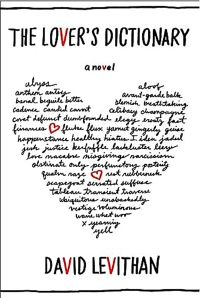The lover’s dictionary – a novel, by David Levithan
I saw this book the other day in the hands of one of my colleagues from university. I was attracted by the title [I know, I know…] and I took a quick look at it. I was surprised to see that book was ACTUALLY a dictionary. I was intrigued. I wrote down the title and decided to read it.
I am glad I did. This is one smart book. Let me explain: The lover’s dictionary tells its story through dictionary entries [ok, duh, but I was not expecting it to be a real dictionary only by the title]. Carefully selected words that work as titles for the ‘chapters’; their ‘definitions’ are actually bits and pieces of the history of the narrator, not chronologically ordered, and you, dear reader, have to figure out the whens. From ‘aberrant’ to ‘zenith’ we get glimpses into the narrator’s love life with his loved one, their ups and downs.
The reason why I think it is a smart novel is because, besides the entries system, there is a lot left to your imagination: you don’t really know the names of the protagonists; you have the narrator [who I believe is a male] and his loved one [who you can’t really tell]. You don’t know where they live exactly, you don’t know what their work is, and you kinda estimate the date, but all is a guess. It only serves to prove the point that love does not know gender or rules, that it happens to everyone [eventually] and does not discriminate. It doesn’t matter what kind of couple they are. It matters that they love each other and share their lives. But hey, this is not a happily ever after tale. There are problems, fights, betrayals, pain. But that is all part of package, I guess.
I also enjoyed how unpretentious the novel is: the entries give it a certain flow, the words carefully chosen, some entries complementing others. I read in a matter of a few hours and enjoyed it very much. It is not treatise on love or anything, but it feels very intimate and honest.
Some of my favorite entries:
‘detachment, n.: […] Even when I detach, I care. You can be separate from a thing and still care about it. If I wanted to detach completely, I would move my body away. I would stop the conversation midsentence. I would leave the bed. Instead, I hover over it for a second. I glance off in another direction. But I always glance back at you.’
‘fast, n. and adj.: […] You make it a production. Slam doors. Knock things over. Scream. But I just leave. Even if I’m still standing there, I leave. I am refusing you. I am denying you. I am an adjective that is quickly turning into a noun.’
‘reservation, n.: There are times when I worry that I’ve already lost myself. That is, that my self is so inseparable from being with you that if we were to separate, I would no longer be. I save this thought for when I feel the darkest discontent. I never meant to depend so much on someone else.’
– David Levithan. The lover’s dictionary – a novel. The Text Publishing Company : Australia, 2011.

I’ve been meaning to read this for ages, but I wasn’t feeling very “positive” towards it. I didn’t know it was a dictionary! haha books going bazinga on us 😛
i know! I don’t think I would have read it if I hadn’t seen it 😛
Believe me, you’ll read it very fast 🙂